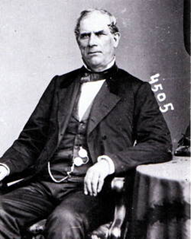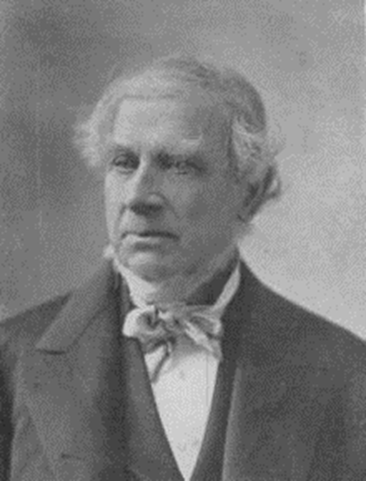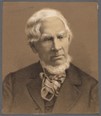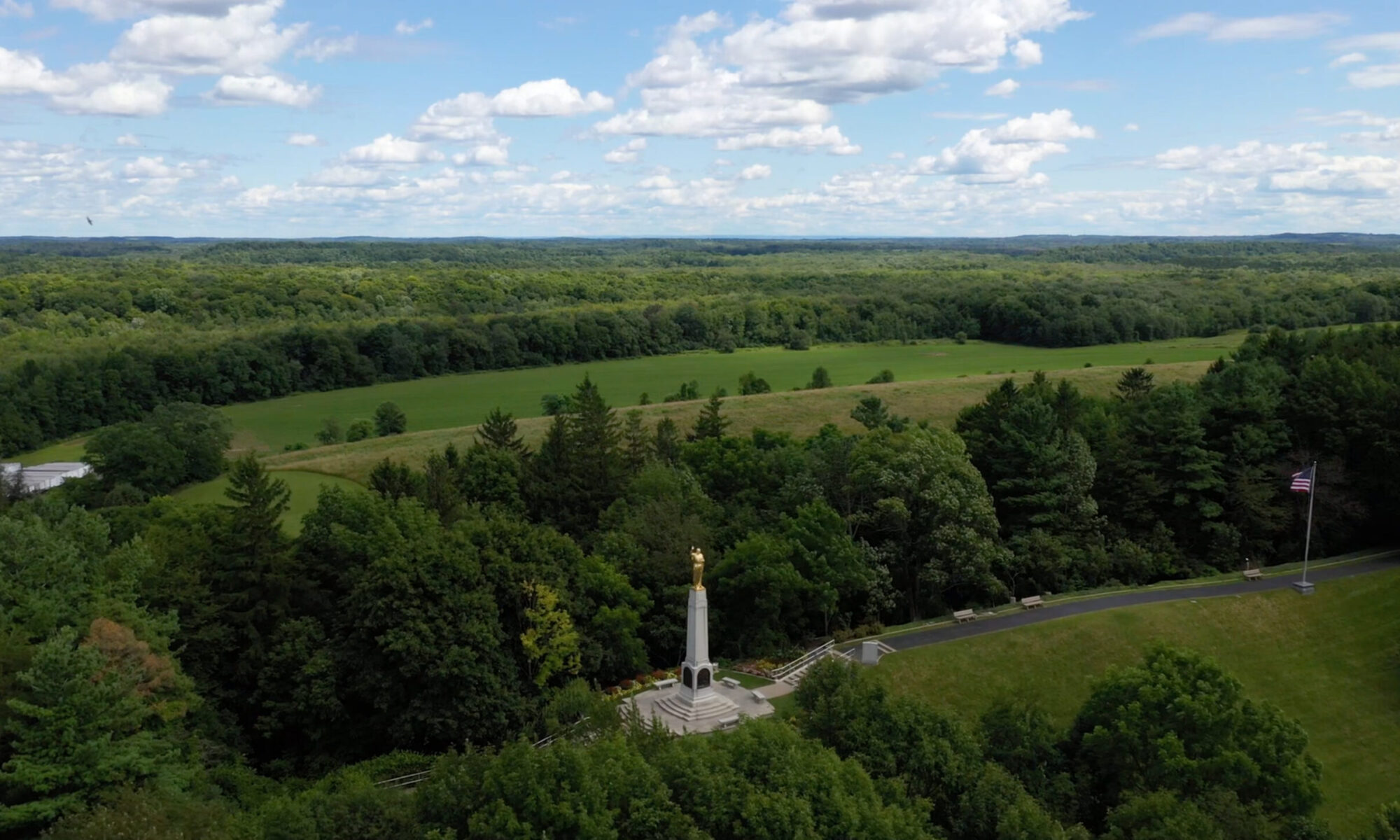



Thurlow Weed was the oldest of six children born to Joel Weed and Mary Ells. He was born on November 15, 1797 in Cairo, Green County, New York. Thurlow said of his father, “My father was a hard-working man with a kind heart, and an earnest desire to do the best he could for his children.”[1] Doing the best to Joel Weed did not mean bringing home a large paycheck. Joel was a poor farmer. Thurlow attended school sporadically in his childhood and youth because of needing to work on the family farm. In addition to farm work, Thurlow had a variety of odd jobs to help pay family expenses. He blew the bellows for a blacksmith, was a cabin boy aboard a ship, and worked in a tavern. When his family moved to Catskill in Central New York, Thurlow got his first taste of the newspaper business working for the Catskill Recorder carrying papers to subscribers.
War of 1812
Thurlow’s interest in newspapers was put on hold on June 18, 1812 when the US Congress declared war on Great Britain.[2] Male residents of Central New York (ages eighteen to forty-five) were called to colors in the emergency.[3] Although Thurlow was only fifteen years old at the outbreak of the war, he enlisted in the militia at Utica, New York. He was assigned to a regiment of eight hundred men and marched to Sackett’s Harbor to confront the British. While in the military, Thurlow wrote of being more interested in meeting and hobnobbing with the “who’s who” in political stature than the war effort. Before the Treaty of Ghent ended hostilities by formal ratification on February 17, 1815, Thurlow held the rank of Quartermaster-Sergeant of the 40th Regiment of the New York State Militia.
When he returned to civilian life, Thurlow moved from one New York community to another, touting his skills in the newspaper business and dropping the names of important men he had met in the war. In so doing, he became his own cheerleader and self-promoter and quickly moved up from apprentice to foreman of the Albany Register, printed at the state capitol.
On April 26, 1818 after a four year engagement, Thurlow married Catharine Ostrander in the Presbyterian Church at Cooperstown, Otsego County, New York. To their union were born three children, two living to adulthood.
Three years after their marriage, at age twenty-four Thurlow moved his family to Rochester and became the editor of the Rochester Daily Telegraph and the darling of the local Whig Party. On November 10, 1824, he was elected to represent Monroe County in the New York Assembly by a majority of six hundred votes.[4] In the legislative assembly, Thurlow was very persuasive and influential in pushing through legislation that benefitted Western New York. For example, on December 8, 1824 he pushed forward a bill to organize the Commercial Bank of Rochester.[5] This singular act endeared him to the citizens of Rochester.
With politics taking center stage in his career, in 1825 Thurlow was recognized as a “powerful political figure.” Believing the unsolicited compliments, Thurlow sold half his interest in the Rochester Telegraph in order to have more time to focus on political issues. The extra time paid off. On October 24, 1827, the name Thurlow Weed flashed across the nation. When a coroner’s report was issued on William Morgan, Thurlow Weed assisted in disinterring the body and examining the body to determine cause of death.[6] Why was this significant? When William Morgan announced his intention to publish a book exposing Freemasonry’s secrets, he was arrested on trumped-up charges and disappeared soon after. It was rumored that William Morgan was kidnapped and killed by masons from Western New York. The allegations surrounding Morgan’s disappearance and presumed death led to a public outcry. Thurlow Weed harnessed the discontent by founding the Anti-Masonic Party. In 1828, he organized support for US presidential candidate John Quincy Adams. In 1829, Thurlow was elected again to the New York State Assembly.[7]
At this point, Thurlow had not met Joseph Smith or Martin Harris. Therefore, it cannot be assumed that he had anything to do with stealing the manuscript pages. Thurlow Weed was all about politics, anti-Masonry, and his importance in political circles.
Joseph Smith and Martin Harris visited with Thurlow Weed
While battling critics of his anti-Masonic stance in the newspaper, Thurlow Weed had two visits with the Prophet Joseph Smith at his Rochester Telegraph office. In his own words, Thurlow wrote—
About 1829 a stout, round, smooth-faced young man, between twenty-five and thirty, with the air and manners of a person without occupation, came into the Rochester Telegraph office and said he wanted a book printed, and added that he had been directed in a vision to a place in the woods near Palmyra, where he resided, and that he found a “golden Bible,” from which he was directed to copy the book which he wanted published. He then placed what he called a “tablet” in his hat, from which he read a chapter of the “Book of Mormon,” a chapter which seemed so senseless that I thought the man either crazed or a very shallow imposter, and therefore declined to become a publisher, thus depriving myself of whatever notoriety might have been achieved by having my name imprinted upon the title-page of the first Mormon Bible. It is scarcely necessary to add that this individual was Joseph Smith, the founder of the Mormon creed.
On the day but one following he came again, accompanied by Martin Harris, a substantial farmer residing near Palmyra, who had adopted the Mormon faith, and who offered to become security for the expense of printing. But I again declined.[8]
Thurlow Weed was a newspaper man not a book publisher. By 1828, he was only part owner of the Rochester Telegraph newspaper. In addition, he had no particular interest in religion. His interest was politics—local and national. Nothing about publishing the Book of Mormon would advance his ambitions. Turning down Joseph Smith on publishing the Book of Mormon had little to do with the nature of the Book of Mormon. It had more to do with Thurlow not seeing a direct benefit to his political agenda by publishing such a work and the fact that his presses were inadequate. If Thurlow had been gifted with vision, he would have seen publishing the Book of Mormon would perpetuate his name for generations.
Character Traits to Consider
There is something shady that shows up in the life of Thurlow Weed. He is a “bounty hunter.” How many printers and politicians can claim that role?
On May 26, 1830 the following payments have been made out of the treasury of the state – on August 22nd, 1828 a $193.55 was paid to Thurlow Weed for pursuing Elisha Adams to Vermont and bringing him back to New York. On February 3, 1830 Thurlow was paid $150.82 for pursuing to Vermont and apprehending Orson Parkhurst (There is a cross by his name which suggests that Thurlow killed the man.)[9]
The Geneva Gazette and Mercantile Advertiser of October 27, 1830 referred to Thurlow Weed as an “umpire or dictator of the anti-Masons in Ontario County.”[10] Thurlow brushed aside the accusation. Yet, it was well known that the Albany Evening Journal supported anti-Masonry. But then comes a bribe. On September 12, 1832, a coalition ticket for presidential electors was the result of a bargain between Thurlow Weed and John Spencer and Matthew L. Davis. Thurlow took a bribe from these men to not speak or write against masonry. Although Thurlow was known as an agent for the anti-Masonic party, due to accepting the bribe he didn’t say a word against the masons in upcoming articles.[11] Anti-masons picked up on the about-face of Thurlow Weed and called him out with a scathing rebuke. Thurlow sent letters attempting to justify his actions, but they were unconvincing.[12]
Then comes manipulative dishonesty. In December 1830, when Frank Granger, a one-time real estate partner of Solomon Spalding (of the Lost Manuscript fame) and the 1828 Republican candidate for Lieutenant Governor of New York and for Governor of New York in 1830, took a romantic interest in the widow of William Morgan, Thurlow Weed recommended that anti-masonry could reignite by perpetuating Frank Granger’s matrimony to the afflicted widow.[13]
On September 27, 1842 famed author J. Fennimore Cooper (The Last Mohicans) brought a court case against Thurlow Weed. When a verdict of $200 was pronounced against Thurlow, he vilified Cooper in the press. (Recall that Fennimore Cooper had hired Luther Bradish as his legal agent.)[14]
The Republican Party and Abraham Lincoln
In 1856, Thurlow helped organize the Republican Party in the state of New York. He turned the Albany Evening Journal into a Republican newspaper and in so doing, lined his pockets. In 1860 at age sixty-three, Thurlow had a real wealth of $20,000 and a personal wealth of $30,000.[15]
Thurlow Weed became so influential in the Republican Party that he was asked to manage William H. Seward’s campaign for the Republican presidential nomination against Abraham Lincoln. When Seward lost the Republican bid, Thurlow lent his support to Lincoln—
One day Abraham Lincoln summoned Thurlow Weed, and said, “I need ten thousand dollars.” He didn’t say why, and Thurlow didn’t ask why. Thurlow thought for a minute. He said, “I will need you to put that in writing, and then I can help you.” Lincoln wrote a sentence, and signed his name. Thurlow took the letter to 10 wealthy men, and each pledged $1000, signing his name.[16]
When Lincoln was elected president of the United States, he sent Thurlow Weed to England as a “propagandist.” It was then that Thurlow made a strategic political mistake. In 1863, he wrote against the Emancipation Proclamation on the grounds that it should be more gradual. In so doing, he lost favor with the Lincoln administration. Henry Ward Beecher tried to demolish him. In a desperate move, Thurlow attempted to organize a new political party—The Union Party of New York.[17] It didn’t work. Thurlow made an attempt to withstand the wrath of the Lincoln administration by throwing his support behind Andrew Jackson.[18] But no matter how historians view it, by the mid-1860s Thurlow’s influence in Washington DC and the Republican Party was at an end.
Declining Influence and Origin, Rise and Progress of Mormonism
In 1865 Thurlow Weed sold the Albany Evening Journal, retired from politics, and moved to New York City. He resided on 12th Street in the New York 15th District. In the big city, he edited a newspaper and took part in politics but was no longer influential. In a September 29, 1865 article in the Penn-Yan Democrat, Thurlow is referred to as the “noxious Weed and Old Man and a hypocrite—a man without principles . . . the biggest toad in the political puddle.”[19]
It was when his influence and reputation was at an all-time low that Pomeroy Tucker asked him to write a letter for the preface of Origin, Rise and Progress of Mormonism. The letter read—
NEW YORK, June 1, 1867. DEAR SIR: I have been so constantly occupied, that I really did not get time to say how much I was interested in your history of Mormonism. I have long hoped that some person with personal knowledge of the origin of this great delusion—who saw it as I did, when it was “no bigger than a man’s hand,” and who has the courage and capacity to tell the whole truth, would undertake the task. I read enough of your manuscript to be confident that you have discharged this duty faithfully. The character you have given “Joe Smith,” his family and associates, corresponds with what I have often heard from the old citizens of Palmyra. Such a work is wanted, and no one but a writer personally and familiarly acquainted with the false prophet and his surroundings could have written it. Truly yours, THURLOW WEED
The Thurlow Weed letter held little weight. Unfortunately, Latter-day Church historians have viewed his letter as a weighty slam against Joseph Smith and the Book of Mormon. Written before the mid-1860s such would have been the case. Written in 1867, the letter had negligible value.
Death of Thurlow Weed
Although Thurlow tried to regain his political and print status by lending support to the candidacy of Ulysses S. Grant and minor candidates, no one paid him much mind. Although his political influence was nil, Thurlow was not left comfortless. He lived a very luxurious lifestyle—“he is surrounded by comforts.”[20] He has monies to spare as evidenced by his sending $1,000 for the relief of Ireland on February 6, 1880.[21]
In fall of 1882, Thurlow suffered from blindness and chronic vertigo. He died surrounded by family on November 22, 1882 at his home in New York City at age eighty-five.[22] He was buried in the Albany Rural Cemetery at Menands, Albany County, New York.
Thurlow Weed’s Timeline
1797 – Thurlow Weed was born on November 15 in Cairo, Greene County, New York.
1811-1815 – During the War of 1812, Weed served as a quartermaster sergeant in the local militia, experiencing military life but not seeing combat.
1818 – After the war, he began his career in journalism, moving to Norwich, New York, where he worked on the local newspaper.
1824 – Weed became the editor of the Rochester Telegraph, a position that allowed him to become increasingly involved in New York politics.
1825 – He established the Anti-Masonic Enquirer in Rochester, New York, to advocate against the secretive Masonic society, which he blamed for the disappearance of William Morgan, a critic of the Freemasons.
1830 – Weed moved to Albany to start the Albany Evening Journal, which rapidly became the mouthpiece for the Anti-Masonic, and later, the Whig Party.
1838 – Under Weed’s leadership, the Whig Party grew stronger, and he became a key political strategist and advisor. He played a critical role in William H. Seward’s election as Governor of New York.
1840s-1850s – Weed continued to wield significant influence in state and national politics. He supported Henry Clay’s presidential campaigns and was instrumental in the founding of the Republican Party in the mid-1850s.
1860 – He played a significant role in Abraham Lincoln’s nomination and election to the presidency. Despite not holding any elected office, Weed was one of the Republican Party’s primary strategists.
1861-1865 – During the Civil War, Weed supported the Union cause and was involved in political efforts to maintain support for Lincoln’s administration.
Late 1860s – After the war, his influence began to wane as new political leaders emerged. He retired from active political life but continued to write and influence public opinion through his writings.
1880 – Thurlow Weed died on November 22 in New York City.
Children of Thurlow and Catherine Weed
1. Harriet Ann Weed (1820–1829).
2. James Birdsall Weed (June 18, 1821–1851). He died in Troy, New York.
3. Maria Weed (July 5, 1823–). She was born in Rochester, New York. She was christened on December 29, 1843 in the First Presbyterian Church in Albany, New York. She married Ogden Moseley Alden (1813–1878) on July 10, 1844 in Connecticut. In 1875, she was residing in Washington, New York.
The following two children were daughters of James Weed and Hannah Currier. It is assumed that Thurlow and Catharine Weed adopted these children.
1. Emily Peck Kempshall Weed (October 10, 1827–February 10, 1889). She was born in Albany, New York. She married William Barnes (1824–1913) on July 10, 1849. She was a resident of Albany, New York.
2. Mary Isabella Weed (1849–1854). She was born and died in Albany, New York.
[1] Harriet A. Weed, Life of Thurlow Weeding including his Autobiography and a Memoir Volume 1 (Boston: Houghton, Mifflin and Company, 1883).
[2] Current, Williams, and Freidel, American History: A Survey, p. 200.
[3] Clark, Military History of Wayne County, New York, pp. 245–246.
[4] “Triumph of the People,” Ontario Repository, November 10, 1824.
[5] “Documents,” Ontario Repository, December 8, 1824.
[6] “Coroner’s Report,” Geneva Gazette and General Advertiser, October 24, 1827.
[7] “Anti-Masonic State Convention,” Geneva Gazette and General Advertiser, March 11, 1829.
[8] Life of Thurlow Weed, including His Autobiography and a Memoir, 1:258–259; Smith, History of Joseph Smith by His Mother, p. 148; Tucker, Origin, Rise, and Progress of Mormonism, pp. 3–4.
[9] “To carry into effect these acts of the legislature …,” Geneva Gazette and Mercantile Advertiser,
May 26, 1830.
[10] “Political Anti-Masonry as It Is,” Geneva Gazette and Mercantile Advertiser, October 27, 1830.
[11] “The Fraud Developed,” Geneva Gazette and Mercantile Advertiser, September 12, 1832.
[12] See Thurlow Weed File. University of Rochester, Rochester, NY.
[13] Spirit of the Times and the People’s Press [Batavia, NY], December 28, 1830.
[14] “Verdict,” Geneva Advertiser, September 27, 1842.
[15] US Federal Census, 1860.
[16] Letter of Abraham Lincoln to Thurlow Weed. University of Rochester, Rochester, NY.
[17] “News and War Items,” Geneva Daily Gazette, February 20, 1863.
[18] Thurlow Weed Biography on Ancestry.com.
[19] “Editorial Brevities,” Penn-Yan Democrat, September 29, 1865.
[20] “Thurlow Weed,” Geneva Daily Gazette, February 6, 1880.
[21] “Current General News,” Geneva Daily Gazette, February 6, 1880.
[22] “Thurlow Weed,” The Times [Philadelphia, PA], November 23, 1882.
